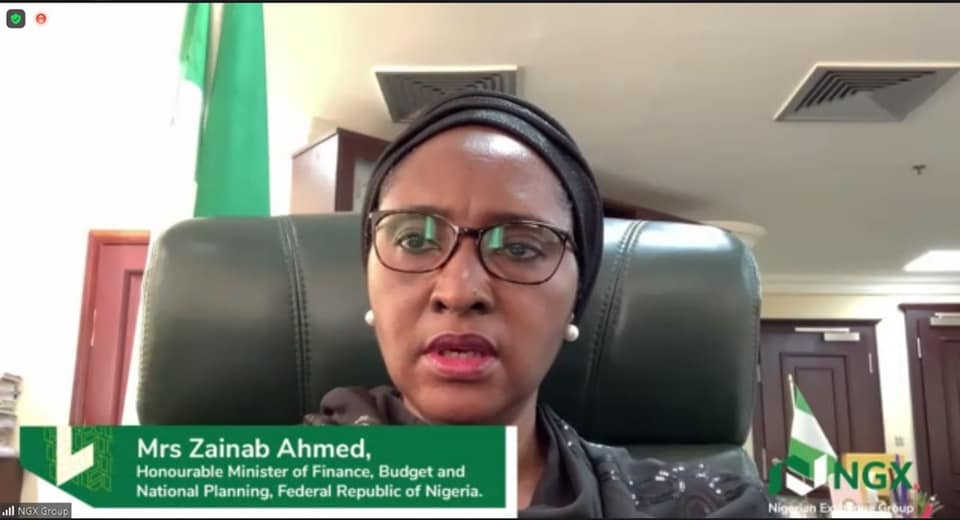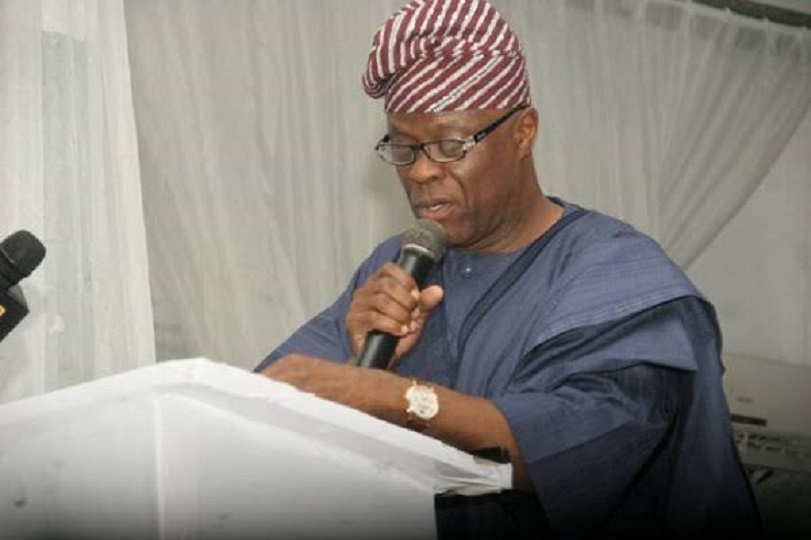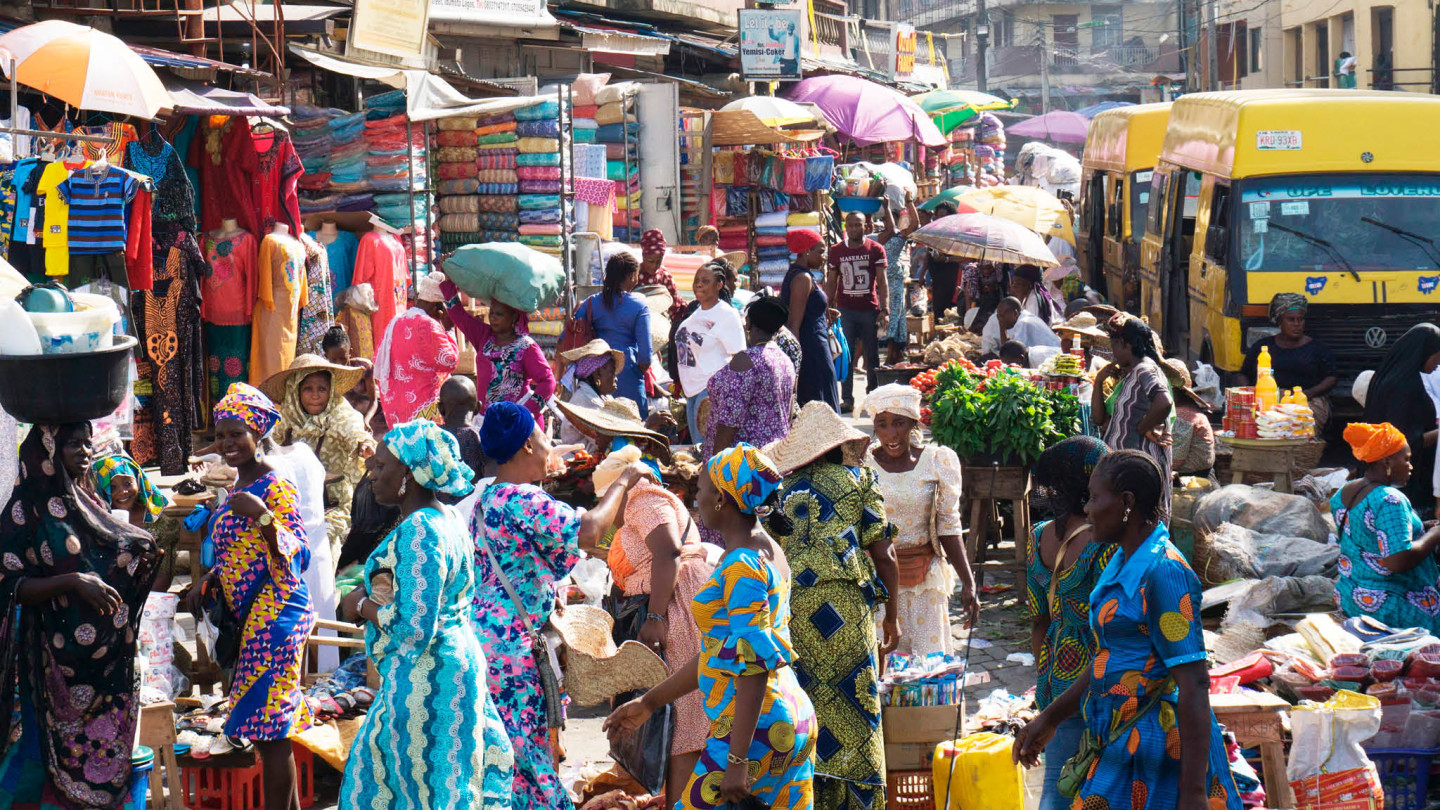Economy
Nigerian Economy is Truly Diversified—Ahmed

The federal government has expressed its commitment to continue to improve the diversification of the economy by steadily growing other sectors, particularly the commodities trading ecosystem.
The assurance was given by the Minister of Finance, Budget and National Planning, Mrs Zainab Ahmed, during the presentation of a Gold coin to her by the Lagos Futures and Commodities Exchange in Abuja over the weekend.
Mrs Ahmed expressed her pleasure at the presentation as she stated that it is one of the results of the federal government’s commitment to continuing to improve efforts at diversifying the economy.
“This is really pleasing for me because we have been trying to improve the diversification of the Nigerian economy. People say we need to diversify the economy, but the Nigerian economy is truly diversified.
“Our GDP today has a 6.4 per cent contribution from the oil and gas sector, so 94.6% of the Nigerian economy is from other sectors. One of the sectors that we have been trying to activate its full potential is the mining sector.
“The mining sector today is still very small, but that is on the side of the government. But in the private sector, and now I am glad in the states, there are very active mining activities that are taking place.
“Unfortunately, until now, we have not been getting the full value of the mining activities. Mining activities have been largely artisanal; there are a lot of participants that take out our minerals without reporting it, without government or even the miners getting full value for it,” she said.
The Minister stated that in a bid to get the full value of mining activities in the country, the President approved and set up the Presidential Gold Mining Scheme with the Solid Minerals Development Agency leading.
“They had set up a pilot that started from Kebbi State where they supported the artisanal miners to be able to practise better mining practices and also to off-take the minerals that they mine, and do some first-level refining. Then the Central Bank offtakes this and sends it out of the country for proper mining.
“The essence for us is to begin to hold our reserves in minerals like gold so that our reserves are not all in US dollars. We know what happens to US dollars and what can happen to them. We are beginning to have our reserves in gold,” Mrs Ahmed stated.
She disclosed that the scheme, even though it was started by the federal government, has seen refineries beginning to actually work in Nigeria, adding that there is one in Ilesha, Segilola, which was the first refinery that was licensed in Nigeria.
According to Mrs Ahmed, “This gold is now being mined in Nigeria, refined in Nigeria up to the point of producing billions and then off taken by the CBN and other organisations like the LCFE. They are also coming forward to facilitate the trading of gold in the commodities exchange in Nigeria. That’s what we want; we wanted to be able to activate the full circle. What was missing was the off taking; now, the off-take is being addressed, and this will help to drive demand.
“Once there is demand in the market end, the producers will be encouraged to produce more, there will be more employment, and we will begin to see more banks supporting this mining sector. Before now, the banks were not too interested in supporting the mining sector because of the long gestation period. The investment is actually worthwhile, and we will encourage these businesses to grow and produce more. I want to congratulate the LFCE for being the first of its kind in Nigeria to achieve this”.
The Minister congratulated the SEC for pushing the milestone and expressed the hope that more commodities exchanges will come up as a result. She, therefore, charged the SEC to enable these companies to be able to operate because it is needed in the market to drive the kind of volumes that Nigeria hopes to get.
In his remarks, the Director-General of the Securities and Exchange Commission (SEC), Mr Lamido Yuguda, commended the Minister and the federal government on their determination to bequeath a vibrant commodities sector.
He stated that, “LCFE is into a number of commodities, and gold is just one of them. They have worked hard in this gold sector. This gold is 100% Nigerian gold, mined and refined in Nigeria, and I am happy that we have your support in this. Thank you very much for making this possible; we appreciate all the guidance and support you have provided so far”.
Also speaking, the Managing Director of LCFE, Mr Akin Akeredolu-Ale, expressed appreciation to the SEC for all the regulatory support the commission has provided in recent times.
Mr Akeredolu-Ale stated that Nigeria is a commodities country but has a large potential that is untapped so far and solicited the support of the National Assembly in passing the Investments and Securities Bill, which e said will bring about massive development in the sector.
“I thank the SEC for pushing the Investments and Securities Bill because that is the legal and regulatory framework that is supposed to support the capital market and, by default, the commodities trading ecosystem.
“We are hoping that the bill is approved so that we are able to have a hold on the commodities space and the revenues that are slipping out of Nigeria. We need that bill passed to be able to function more effectively,” he added.
Economy
Naira Down Again at NAFEX, Trades N1,359/$1

By Adedapo Adesanya
The Naira further weakened against the Dollar in the Nigerian Autonomous Foreign Exchange Market (NAFEX) for the fourth straight session this week on Thursday, February 26.
At the official market yesterday, the Nigerian Naira lost N3.71 or 0.27 per cent to trade at N1,359.82/$1 compared with the previous session’s N1,356.11/$1.
In the same vein, the local currency depreciated against the Pound Sterling in the same market window on Thursday by N8.27 to close at N1,843.23/£1 versus Wednesday’s closing price of N1,834.96/£1, and against the Euro, it crashed by N8.30 to quote at N1,606.89/€1, in contrast to the midweek’s closing price of N1,598.59/€1.
But at the GTBank forex desk, the exchange rate of the Naira to the Dollar remained unchanged at N1,367/$1, and also at the parallel market, it maintained stability at N1,365/$1.
The continuation of the decline of the Nigerian currency is attributed to a surge in foreign payments that have outpaced the available Dollars in the FX market.
In a move to address the ongoing shortfall at the official window, the Central Bank of Nigeria (CBN) intervened by selling $100 million to banks and dealers on Tuesday.
However, the FX support failed to reverse the trend, though analysts see no cause for alarm, given that the authority recently mopped up foreign currency to achieve balance and it is still within the expected trading range of N1,350 and N1,450/$1.
As for the cryptocurrency market, major tokens posted losses over the last 24 hours as traders continued to de-risk alongside equities following Nvidia’s earnings-driven pullback, with Ripple (XRP) down by 2.7 per cent to $1.40, and Dogecoin (DOGE) down by 1.6 per cent to $0.0098.
Further, Litecoin (LTC) declined by 1.3 per cent to $55.87, Ethereum (ETH) slipped by 0.9 per cent to $2,036.89, Bitcoin (BTC) tumbled by 0.7 per cent to $67,708.21, Cardano (ADA) slumped by 0.6 per cent to $0.2924, and Solana (SOL) depreciated by 0.4 per cent to $87.22, while Binance Coin (BNB) gained 0.4 per cent to sell for $629.95, with the US Dollar Tether (USDT) and the US Dollar Coin (USDC) closing flat at $1.00 each.
Economy
Crude Oil Falls as Geopolitical Risk Around Iran Clouds Supply Outlook

By Adedapo Adesanya
Crude oil settled lower on Thursday as investors tracked developments in talks between the United States and Iran over the latter’s nuclear programme, weighing potential supply concerns if hostilities escalate.
Brent crude futures lost 10 cents or 0.14 per cent to close at $70.75 a barrel, while the US West Texas Intermediate (WTI) crude futures depreciated by 21 cents or 0.32 per cent to $65.21 a barrel.
The US and Iran held indirect talks in Geneva on Thursday over their long-running nuclear dispute to avert a conflict after US President Donald Trump ordered a military build-up in the region.
Prices had gained earlier in the session after media reports indicated the talks had stalled over US insistence on zero enrichment of uranium by Iran, as well as a demand for the delivery of all 60 per cent-enriched uranium to the US.
However, prices then retreated after the two countries extended talks into next week, reducing the immediate strike potential.
Iran’s Foreign Minister, who confirmed talks will continue next week, said Thursday’s talks were the most serious exchanges with the US yet, saying Iran clearly laid out its demand for lifting sanctions and the process for relief.
His counterpart from Oman, who is handling the talks, said significant progress was made in Thursday’s talks. The Omani minister’s upbeat assessment followed indirect talks between Iranian Foreign Minister and US envoys Steve Witkoff and Jared Kushner in Geneva, with one session in the morning and the second in the afternoon.
He will also hold talks with US Vice President JD Vance and other US officials in Washington on Friday.
The Trump administration has insisted that Iran’s ballistic missile program and its support for armed groups in the region must be part of the negotiations.
The American President said on February 19 that Iran must make a deal in 10 to 15 days, warning that “really bad things” would otherwise happen.
On Tuesday, he briefly laid out his case for a possible attack on Iran in his State of the Union speech, underlining that while he preferred a diplomatic solution, he would not allow Iran to obtain a nuclear weapon.
Meanwhile, the US continues to amass forces in the Middle Eastern region, with the military saying it is prepared to execute orders given by the US President.
Economy
Why Transparency Matters in Your Choice of a Financial Broker

Choosing a Forex broker is essentially picking a partner to hold the wallet. In 2026, the market is flooded with flashy ads promising massive leverage and “zero fees,” but most of that is just noise. Real transparency is becoming a rare commodity. It isn’t just a corporate buzzword; it’s the only way a trader can be sure they aren’t playing against a stacked deck. If a broker’s operations are a black box, the trader is flying blind, which is a guaranteed way to blow an account.
The Scam of “Zero Commissions”
The first place transparency falls apart is in the pricing. Many brokers scream about “zero commissions” to get people through the door, but they aren’t running a charity. If they aren’t charging a flat fee, they are almost certainly hiding their profit in bloated spreads or “slippage.” A trader might hit buy at one price and get filled at a significantly worse one without any explanation. This acts as a silent tax on every trade. A transparent broker doesn’t hide the bill; they provide a live, auditable breakdown of costs so the trader can actually calculate their edge.
The Conflict of Market Making
It is vital to know who is on the other side of the screen. Many brokers act as “Market Makers,” which is a polite way of saying they win when the trader loses. This creates a massive conflict of interest. There is little incentive for a broker to provide fast execution if a client’s profit hurts their own bottom line. A broker with nothing to hide is open about using an ECN or STP model, simply passing orders to the big banks and taking a small, visible fee. If a broker refuses to disclose their execution model, they are likely betting against their own clients.
Regulation as a Safety Net
Transparency is worthless without an actual watchdog. A broker that values its reputation leads with its licenses from heavy-hitters like the FCA or ASIC. They don’t bury their regulatory status in the fine print or hide behind “offshore” jurisdictions with zero oversight. More importantly, they provide proof that client funds are kept in segregated accounts. This ensures that if the broker goes bust, the money doesn’t go to their creditors—it stays with the trader. Without this level of openness, capital is essentially unprotected.
The Withdrawal Litmus Test
The ultimate test of a broker’s transparency is how they handle the exit. There are countless horror stories of traders growing an account only to find that “technical errors” or vague “bonus terms” prevent them from withdrawing their money. A legitimate broker has clear, public rules for getting funds out and doesn’t hide behind a wall of unreturned emails. If a platform makes it difficult to see the exit strategy, it’s a sign that the front door should have stayed closed.
Conclusion
In 2026, honesty is the most valuable feature a broker can offer. It is the foundation that allows a trader to focus on the charts instead of worrying if their stops are being hunted. Finding a partner with clear pricing, honest execution, and real regulation is the first trade that has to be won. Flashy marketing is easy to find, but transparency is what actually keeps a trader in the game for the long haul.
-

 Feature/OPED6 years ago
Feature/OPED6 years agoDavos was Different this year
-
Travel/Tourism10 years ago
Lagos Seals Western Lodge Hotel In Ikorodu
-

 Showbiz3 years ago
Showbiz3 years agoEstranged Lover Releases Videos of Empress Njamah Bathing
-

 Banking8 years ago
Banking8 years agoSort Codes of GTBank Branches in Nigeria
-

 Economy3 years ago
Economy3 years agoSubsidy Removal: CNG at N130 Per Litre Cheaper Than Petrol—IPMAN
-

 Banking3 years ago
Banking3 years agoSort Codes of UBA Branches in Nigeria
-

 Banking3 years ago
Banking3 years agoFirst Bank Announces Planned Downtime
-

 Sports3 years ago
Sports3 years agoHighest Paid Nigerian Footballer – How Much Do Nigerian Footballers Earn





















